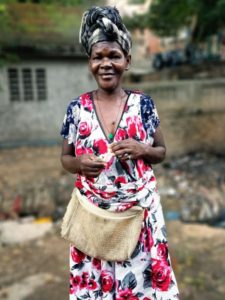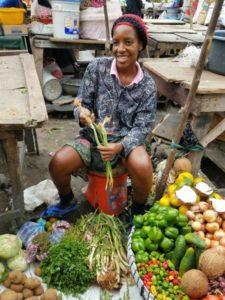
“Rosemary deColine perches atop a rickety chair on a dusty 4-foot-wide rock ledge in Pétion-ville, Haiti, selling a small selection of tomatoes, beans and carrots. Every morning before 6am, she walks to her spot with a narrow dirt road on one side and a trash-filled ravine on the other. She stays until 5 at night, holding an umbrella over herself when it rains, sometimes not selling any vegetables at all. Rosemary has been selling at this roadside market for as long as she can remember and used to sell little bits of charcoal used for cooking. Handling charcoal and inhaling its fumes for years can cause severe lung and breathing problems, and Rosemary became very ill. Four years later and recovered now, her face grows serious as she discusses the importance of a medical clinic in the market. Emphatically she declares they need a medical clinic in the market “more than anything.”
Rosemary is just one of the thousands of women who will benefit from Heart to Heart International’s newest project. In early 2018, Heart to Heart International is installing a toilet and opening a medical clinic in the largest market in Pétion-ville. The clinic will provide primary and emergency care for thousands and thousands of these women. It will quite literally be a life-saver for women like Rosemary who have no other option.
Haiti is the third poorest country in the world. Over 80 percent of women who work in Haiti work in informal jobs, with the average annual income of Haitian women almost half that of men ($1,250 US for women versus $2,247 US for men). Women who work as market vendors typically buy goods from other sources and resell them in the markets, paying anywhere from ($6.25-$43.75 US) per week for a stall in an official market. They spend long hours in the sun selling everything from fruits, vegetables and prepared foods, to clothing, shoes and household goods.
The noise in these crowded markets can, at times, be deafening, and the bright colors of the food and clothes contrast sharply with the sepia-toned layer of dirt that blankets everything else. In Pétion-ville, a town outside of Port-au-Prince, Haiti, there are more than 40 open-air markets, ranging in size from hundreds of women selling goods to more than 5,000.
A unique combination of smells wafts through these Pétion-ville markets – spices, garbage, traditional foods and spoiled produce – mixing with the pungent odor of sweat and urine. Even though women spend up to 12 hours a day working in these markets, most markets have no toilets.
Women instead urinate in containers which they then pour into empty plastic bottles reused from water, soda or juice drinks. If that is not an option, or women don’t want to do that, they find a corner and urinate on the ground. Dirt, dust and the inability of women to clean themselves cause a variety of rampant infections.
Jean Christiane knows about this health problem. She sells shoes and clothing in the biggest market in Pétion-ville and even pays more for a stall with a concrete floor in a covered section of the market. She gestures around, saying, “A clinic would be wonderful, because as you can see, we don’t even have a toilet.” She explains that while she takes her plastic bottles of urine home, many women throw them on the ground or pour them out in the dirt. Being surrounded by the constant smell of urine and trash while working in the sun takes its toll on the health of women.
These women stand or sit in the dirt all day and are dependent on the money earned from reselling goods to keep their household running. They can’t afford not to work, and they can’t afford to go to a hospital. When they are sick, they come to the market anyway. Because of the crowded conditions of the markets, when these women come to work sick, germs spread to other women close by and anyone they interact with. And the cycle continues.
With five children at home to support, Exius Luciana admits to coming to work to sell rice, beans and meat no matter how bad she feels. She lives on a day-to-day basis and her income feeds her family and sends her children to school. Not selling means earning no money, she says, and no money earned means no money to live. So, she and other women continue to come to the markets and grow sicker and sicker. When they finally do go to a doctor, she explains, it might be too late. “Sometimes it’s too late and women die,” she said. Having a medical clinic close would enable these women to receive timely treatment and continue working and earning money for their families.
A devotion to family and children is common for women working in the market. With over a third of Haiti’s population under the age of 15, children are foremost on a lot of minds and the cost of education is often the first thing women list as an expense in their lives. Between 80 to 90 percent of the schools in Haiti are private, whether for-profit, faith-based or run by non-governmental agencies. The remaining schools are public, but are notoriously difficult to get into, are woefully underfunded by the government and lack qualified teachers. The average cost for private school tuition in Haiti is $130 (US) a year, though the average daily income is less than $3 (US).
Madame Briole raised four children while working in the markets. “It is hard to pay for school, but you have to sacrifice for your kids to get an education,” she said. “Even if the country doesn’t offer education, you have to do something.” Madame Briole, a grandmother now, sold salted fish and vegetables 12 hours a day every day for the past 30 years to pay for her children’s school tuitions.
Many of these children come to the markets after school to help their mothers, grandmothers or aunts. Children may be found in every markets, but not every market is the same. The layouts of markets are as varied as the goods sold within. Some have twisted narrow passageways, steep hills and concrete structures transformed into areas of commerce. Some are located behind walls and others are open along the street. Some sections offer permanent protection from the elements, but most utilize a patchwork of tarps, corrugated metal sheets, umbrellas and plastic sheeting for temporary and often unreliable coverage. The larger markets have committees or managers in charge of security and collecting payments from the women.
These committees are generally comprised of men, but Claudette Tengue stands as the only woman in her market with a leadership role working directly with the committee of men. Tengue was elected president of her market by the women who sell in it. She began selling meat with her parents and has been selling meat on her own in different markets around Pétion-ville for 27 years. She came to her current market when it opened 15 months ago when she was then elected president. Her aim as president is to find help for projects to improve the lives of the women in her market. She describes her priorities for her market as she chops off pieces of meat in assorted sizes for her customers. In between each thwack of her hatchet, she explains that sickness is an issue all the women in the market contend with. “I want to first get a structure built around the market to give the women shelter. These women spend all day in the sun, and then you get rain, you get a lot of sickness.” Selling all day and serving as president is hard, Tengue allows, but it is a sacrifice she feels is worth it to make life better for all the women.

One of the women Tengue is working to help is Zette Nozylus. She sits on an overturned bucket at a small spot in the center of the market selling onions, carrots and eggplants. She has a vision, though, of a bigger business with more things to sell. Six months ago, she gave birth to a son. He is her fourth child, but her only still alive. The other three died in infancy or childhood. Zette knows the value of having medical care nearby. “It is so important to have a clinic close,” she said, “because when your body needs help, you need to have it near.”
Haiti’s infant and child mortality rate is the highest in the Caribbean with 46.8 deaths for every 1,000 children under the age of 5. This is compared to 17.5 out of 1000 for neighboring Dominican Republic and 5.8 for the United States. One of the aims of having the clinic adjacent to where so many women work is to provide prenatal care, pediatric nutritional counseling and medical care when children grow ill with the goal reducing that high rate of infant and child mortality for women in the markets.
In collaboration with Pétion-ville city officials, Heart to Heart International is making this clinic a reality. HHI will also be installing a toilet in the market to improve sanitation within the market and prevent issues that stem from the current lack of toilets. These two additions will drastically improve the lives and working conditions of thousands of women. Women who work long hours in the hot sun. Women who work to pay for their children’s education. Women who work to improve the lives of other women. Women who have lost children. Women who deserve better.
We need your help to make this happen. In addition to needing your donations, we will be organizing volunteer opportunities for medical professionals as well as people to help construct the clinic and ready it for use. Please contact us if you are interested in this volunteer opportunity. Donate now and help us help these women!
